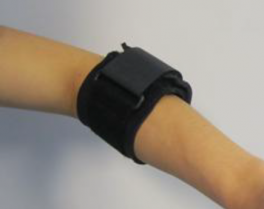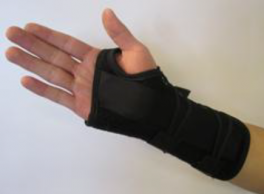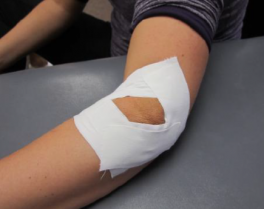Lateral Epicondyle Tendinopathy Toolkit: Section H - Braces, Splints, and Taping: Difference between revisions
Evan Thomas (talk | contribs) No edit summary |
Evan Thomas (talk | contribs) No edit summary |
||
| Line 52: | Line 52: | ||
<br> | <br> | ||
== Diamond Taping Technique (Vicenzino et al 2003<ref>Vicenzino B, Brooksbank J, Minto J, Offord S, Paungmali A. Initial effects of elbow taping on pain-free grip strength and pressure pain threshold. Journal of Orthopaedic & Sports Physical Therapy. Jul 2003; 33(7): 400-7.</ref>) == | == Diamond Taping Technique (Vicenzino et al 2003<ref>Vicenzino B, Brooksbank J, Minto J, Offord S, Paungmali A. Initial effects of elbow taping on pain-free grip strength and pressure pain threshold. Journal of Orthopaedic &amp; Sports Physical Therapy. Jul 2003; 33(7): 400-7.</ref>) == | ||
{| cellpadding="2" border="1" style="border: 1px solid darkgray;" | {| cellpadding="2" border="1" style="border: 1px solid darkgray;" | ||
|- | |- | ||
| width="500" | | | width="500" | | ||
*This taping technique consists of four tape strips, repeated twice. | *This taping technique consists of four tape strips, repeated twice. | ||
*The tape is laid in a diamond shape while pulling the soft tissues centrally towards the lateral epicondyle. | *The tape is laid in a diamond shape while pulling the soft tissues centrally towards the lateral epicondyle. | ||
*The goal is to decrease tension at the epicondyle attachment.<br> | *The goal is to decrease tension at the epicondyle attachment.<br> | ||
<br> | |||
<br> | |||
<br> | |||
<br> | |||
<br> | |||
<br> | |||
| width="300" | | |||
[[Image:LET Appendix E Fig3.png|center|264x230px|Fig 3 of LET App E]]''' Figure 3''' | |||
|} | |||
<br> | |||
== Download Lateral Epicondyle Tendinopathy Toolkit: Appendix C - Details of Exercise Prescription == | |||
http://physicaltherapy.med.ubc.ca/files/2013/07/Appendix-E.-Lateral-Epicondyle-Tendinopathy-Braces-Splints-and-Taping-June-2013.pdf | |||
<br> | |||
== Acknowledgements == | |||
Developed by the BC Physical Therapy Tendinopathy Task Force: Dr. Joseph Anthony, Dr. Angela Fearon, Diana Hughes, Carol Kennedy, Dr. Alex Scott, Michael Yates, & Alison Hoens. | |||
A Physical Therapy Knowledge Broker project supported by: UBC Department of Physical Therapy, Physiotherapy Association of BC, Vancouver Coastal Research Institute and Providence Healthcare Research Institute. | |||
June 2013 | |||
<br> | <br> | ||
== Toolkit Navigation == | |||
*''Click to return to the ''[[Lateral Epicondyle Tendinopathy (Tennis Elbow) Toolkit|''Contents Page'']] | |||
*''Click to return to the ''[[Lateral Epicondyle Tendinopathy Toolkit: Summary of the Evidence|''Summary of the Evidence'']] | |||
*''Click to return to the ''[[Lateral Epicondyle Tendinopathy Toolkit: Treatment Algorithm|''Treatment Algorithm'']] | |||
*''Click to return to ''[[Lateral Epicondyle Tendinopathy Toolkit: Appendix A|''Appendix A: Details of the Articles'']]<br> | |||
*''Click to return to ''[[Lateral Epicondyle Tendinopathy Toolkit: Appendix B|''Appendix B: Manual Therapy'']] | |||
*''Click to continue to ''[[Lateral Epicondyle Tendinopathy Toolkit: Appendix D|''Appendix D: LASER Dosage Calculation'']] | |||
*''Click to skip to ''[[Lateral Epicondyle Tendinopathy Toolkit: Appendix E|''Appendix E: Braces, Splints, and Taping'']] | |||
*''Click to skip to ''[[Lateral Epicondyle Tendinopathy Toolkit: Appendix F|''Appendix F: Outcome Measures'']] | |||
*''Click to skip to ''[[Lateral Epicondyle Tendinopathy Toolkit: Appendix G|''Appendix G: Medical and Surgical Interventions'']] | |||
<br> | |||
== References == | == References == | ||
<references /> | <references /> | ||
Revision as of 01:05, 14 August 2013
Counterforce Brace[edit | edit source]
|
Figure 1 |
Wrist Splint[edit | edit source]
|
Figure 2 |
Diamond Taping Technique (Vicenzino et al 2003[2])[edit | edit source]
|
Figure 3 |
Download Lateral Epicondyle Tendinopathy Toolkit: Appendix C - Details of Exercise Prescription[edit | edit source]
Acknowledgements[edit | edit source]
Developed by the BC Physical Therapy Tendinopathy Task Force: Dr. Joseph Anthony, Dr. Angela Fearon, Diana Hughes, Carol Kennedy, Dr. Alex Scott, Michael Yates, & Alison Hoens.
A Physical Therapy Knowledge Broker project supported by: UBC Department of Physical Therapy, Physiotherapy Association of BC, Vancouver Coastal Research Institute and Providence Healthcare Research Institute.
June 2013
[edit | edit source]
- Click to return to the Contents Page
- Click to return to the Summary of the Evidence
- Click to return to the Treatment Algorithm
- Click to return to Appendix A: Details of the Articles
- Click to return to Appendix B: Manual Therapy
- Click to continue to Appendix D: LASER Dosage Calculation
- Click to skip to Appendix E: Braces, Splints, and Taping
- Click to skip to Appendix F: Outcome Measures
- Click to skip to Appendix G: Medical and Surgical Interventions
References[edit | edit source]
- ↑ Meyer NJ, Walter F, Haines B, Orton D, Daley RA. Modeled evidence of force reduction at the extensor carpi radialis brevis origin with the forearm support band. J Hand Surg [Am] 2003; 28:279-87.
- ↑ Vicenzino B, Brooksbank J, Minto J, Offord S, Paungmali A. Initial effects of elbow taping on pain-free grip strength and pressure pain threshold. Journal of Orthopaedic & Sports Physical Therapy. Jul 2003; 33(7): 400-7.









